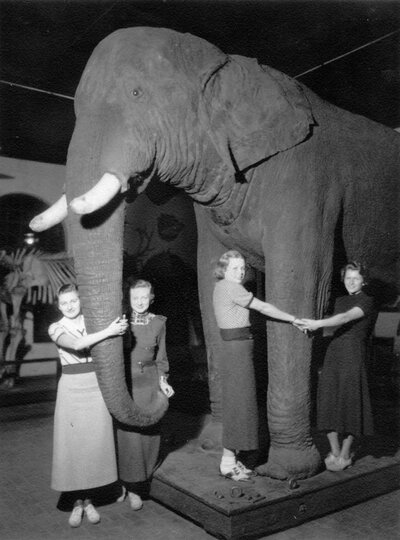2024 field course, Asian Elephants in Context: Animal Behavior and Conservation in Thailand (June 16 – July 12, 2024)
Experience Asian Elephants and community-living in Thailand! This field course explores how the science of animal behavior and wellbeing can be used in conservation to improve outcomes for animals, people, and the environment. During this immersive 4-week field course in Thailand students will gain hands on experience developing and implementing ethological research on a topic of their choice, learning how to record and interpret behavioral data. Students will learn from expert staf, mahouts, and community leaders about community-led conservation work. This is an immersive experience, where students will be engaged in local culture, including language training in Sgaw Karen and Thai.
Led by renowned conservation behaviorist Dr. Liv Baker, and the award winning team at Mahouts Elephant Foundation’s Living in the Forest with Elephants (LIFE) project, this program is suitable for students with a passion for biology, ecology, conservation, animal behavior, animal welfare science, as well as students in the social sciences who are interested in gaining experience in multispecies methodologies. Applications for the course are rolling, but the course is capped at 12 participants so apply early to secure your spot! Details and application
EXP-0025-VS: The Jumbo Imperative: On Elephants and Elephant Conservation (Spring, 2017)
Tufts is the only major university in the world to honor an elephant as its totemic symbol or mascot. The real Jumbo was raised in a zoo, then sold to the famous American showman P. T. Barnum and shipped in 1882 to the United States to perform in the circus. As a circus performer, Jumbo lived in a completely alien environment under very stressful conditions. Perhaps we, as present day Tufts Jumbos, owe a certain loyalty to the remarkable animal group represented by Jumbo: the elephant, one of the last surviving giants of the Pleistocene and currently threatened with an ignominious extinction during our lifetime largely as a result of the global trade in elephants’ teeth. This team-taught course will ask and work to answer the following thematic questions:
- Anatomy, behavior, and cognition: Who or what are elephants?
- Evolution: Where do they come from?
- Ecology: How do they affect global ecosystems?
- Cultural history: How have we used them?
- Conservation: Why are they seriously endangered?
- Technology: What can we do to save them?
- Public policy: What can we do to save them?
Faculty
Dale Peterson, the lead instructor for this course, is a lecturer in English at Tufts and the author, co-author, or editor of twenty-one books on subjects ranging from computers to anthropology to psychiatry to conservation. He has also written about primates, giraffes, and elephants. He holds a PhD in English Literature from Stanford University.

Guest lecturers in this course will include Dr. Karen Panetta from the Tufts Department of Electrical and Computer Engineering, who brings expertise on use of technology to promote the conservation and health of wild elephants; Dr. Allen Rutberg, Director of Center for Animals and Public Policy at the Cummings School of Veterinary Medicine at Tufts, who will contribute three classes on the subjects of population management in the wild, elephants in zoos, and policy tools for U. S. engagement in elephant conservation; and Dr. Felicia Nutter of the Cummings School of Veterinary Medicine, who will teach classes on elephant evolution, ecology, and practical conservation on the ground.